Steve Bull's Blog, page 1211
January 25, 2018
Four Pillars for a Better Future: Knowledge, Consciousness, Innovation, Local Action – Part 1

For many years now, my message has been that tweaking around the edges of a systemically corrupt and discredited economic and political system is not good enough. Rather, what we need is a full scale, species-wide paradigm shift in the way human affairs are conducted on this planet. No small task I know, which is why this series of posts will zero in on four key areas, or pillars, we need to focus on if we’re to evolve and leave this earth meaningfully better than when we arrived.
Knowledge
Let’s kick things off with the low-hanging fruit, knowledge. This is the area I’ve focused on the longest, and my desire to acquire knowledge and share it is what inspired the creation of this website and my dedication to it in the first place.
In this case, the knowledge I’ve been accumulating relates to how the world around us actually functions, as opposed to how we’re told it functions. Some people inform us we live in a Democracy where our vote matters, but overwhelming evidence and life experience demonstrates this to be total nonsense. Others tell us we reside in a Republic where the U.S. Constitution is the supreme inviolable law of the land, but that’s also a lie. In real life, the Constitution is completely ignored by politicians, and most certainly by the unaccountable and unelected shadowy intelligence agencies. Finally, there are those who insist we live in a free market system characterized by countless choices and vibrant competition, but this is rapidly becoming a fantasy to anyone who actually engages in the economy.
The glaring truth of the matter is the U.S. is managed by a unified corporate and political oligarchy that agrees and collaborates on all issues of importance to them irrespective of the meaningless and dishonest Republican or Democratic flags they fly in public.
…click on the above link to read the rest of the article…
Mike Pence’s Middle East Tour: Outright Pressure and Threats as Foreign Policy Tools

Mike Pence’s Middle East Tour: Outright Pressure and Threats as Foreign Policy Tools
Jordan’s King Abdullah II wants Washington to “rebuild trust “after US President Trump recognized Jerusalem as Israel’s capital. The king believes that East Jerusalem must be the capital of Palestine. According to him, from now on the US has a “major challenge to overcome”. “Friends occasionally have disagreements,” Mike Pence said ruefully in his comments on the outcome of the talks. The disagreement came into the open.
The vice president was making his Middle East trip (Jan.19-23) to include three states: Egypt, Jordan and Israel. The Palestinian Autonomy leaders refused to meet him. Egypt was the first country he arrived in to hear that Cairo does not support the US move.
Jordan and Egypt are a special case. They are the only Arab nations to have diplomatic ties and peace accords with Israel. Both are threatened by Islamist militants and would be potential key mediators if peace talks between Israel and the Palestinians were ever revived.
Despite the fact that Jordan is a key member of the US-led coalition formally created to fight the Islamic State (IS), the kingdom has strongly opposed the US administration’s decision to recognize Jerusalem as the capital of Israel announced by President Trump on Dec. 6. Protests have been held in front of the US embassy in Amman ever since. King Abdullah has led intensive diplomatic efforts to build a stronger Arab front and rally international support behind it.
According to Debka, the vice president warned Egyptian and Jordanian leaders of painful times ahead if they don’t stop opposing the US policy. Washington can revise its plans to continue providing economic and military assistance. Besides, Vice President Pence asked them to convey a message to Palestinians that Washington “would block Palestinian Authority access to funding from Western and international institutions”.
…click on the above link to read the rest of the article…
Why the Next Downturn “Will Not Look Like 2008”
Nine years of scorched-earth monetary policies come home to roost.
There are always cycles. The current cycle started at the bottom of the Great Recession and will last “until central banks put on the brakes,” said Ray Dalio, founder of Bridgewater Associates, in an interview with Bloomberg. “We’re in a perfect situation, inflation is not a problem, growth is good, but we have to keep in mind the part of the cycle we’re in.”
We’re “in the late stage of the cycle, a period that might last two years,” he said without specifying how far we’re already into that late stage. We do know that the Fed is gingerly taking the foot off the gas though it hasn’t yet slammed on the brakes.
“When the operating rate gets high enough, when central banks think they should put on the brakes,” he said, “that’s part of the cycle.”
“From 2008 until the central banks put on the brake we have one kind of environment. So now we are closer to its capacity constraints… and we’re still going to have a lot of stimulation… in particular short-term stimulation,” and there is “a lot of cash on the sidelines” by investors, banks, consumers, and companies. “And they can feel that they’re being left out. It feels stupid to own cash in this kind of environment.”
He thinks this environment “is going to be great for earnings and great for stimulation of growth.” But “we have to look beyond that: What is monetary policy going to be in that?”
This short-term stimulus is producing a “spurt,” and this “will be a 12-to-18-month spurt,” and while that spurt is taking place, and while people feel stupid about holding cash, the central banks “will have to tighten monetary policy.”
…click on the above link to read the rest of the article…
Mainstream Media and Imperial Power
Noted journalist and filmmaker John Pilger’s collection of work has been archived by the British Library, but deep-rooted problems of Western media create an increasingly difficult landscape for ethical journalism, as Pilger explained in an interview with Dennis Bernstein and Randy Credico.
Emmy award-winning filmmaker John Pilger is among the most important political filmmakers of the 20th and 21st century. From Vietnam to Palestine to atomic war, Pilger’s work has been on the cutting edge, and his stinging critique of western media has always be revelatory. And, no doubt, his biting analysis is more relevant and important now than ever. His latest film, “The Coming War on China” powerfully presages the growing potential for war between the US and China.
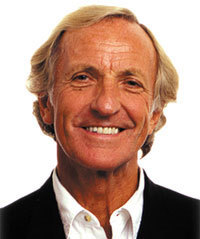
Journalist John Pilger (Wikipedia)
Randy Credico and Dennis J Bernstein spoke with Pilger on January 18 about the multiple failures of the corporate press in fanning the phony flames of Russiagate, and turning its back on Julian Assange–acting more like prosecutors than journalists, whose responsibility it is to monitor the centers of power and report back to the people.
They also spoke with Pilger about the recent decision by the British Library to acquire his substantial works and invaluable archives and make them readily available to a much wider audience
Dennis Bernstein: Congratulations, John. Your work has now been made a part of the collection at the British Library.
John Pilger: To see all my written work over the years go onto a single hard drive was a sobering experience. I am pleased, however, because now in the digital age people can access all of my work and I myself can access information I may have forgotten.
Dennis Bernstein: I would like to read a little of what they said on the record when they welcomed your material into the library.
…click on the above link to read the rest of the article…
January 24, 2018
Cyber War Coming In 2018?
– Cyber war is increasing threat – Investors are not prepared for
– Third most likely global risk in 2018 is cyber war say WEF
– “Scale and sophistication of attacks is going to grow”
– EU, US, NATO lay down ground rules for offensive cyber war
– Ireland is viable target for attackers but is ‘grossly unprepared for cyber war’
– UK should expect attack that cripples infrastructure within 2 years
– Trump administration may use nuclear weapons in response to cyber attacks
– Cyber war designed to have a economic impact on countries
– Invest in physical assets as well as digital assets & currencies
– Avoid ETF and digital gold and own physical gold that is allocated and segregated
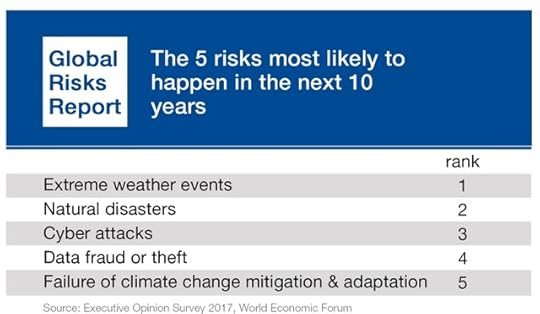
Cyber-attacks are the third most likely global risk for 2018, behind extreme weather conditions and natural disasters, according to a new report by the World Economic Forum.
Estimated to cost over $1 trillion per year, cyber-attacks are now more expensive than natural disasters which in 2017 brought in a bill of $300 billion.
“We are still under resourced in the amount of effort put into trying to mitigate this risk…Cyber is at or above the scale of natural catastrophes [in terms of financial damage caused] and yet the comparative infrastructure is much smaller in scale,” according to John Drzik of WEF report partner Marsh.
The World Economic Forum’s Margareta Drzeniek-Hanouz, head of economic progress, told a press conference that cyber-risks are affecting society and the economy in “new, broader ways.”
They now impact not just the corporate sector as we usually assume but also government infrastructures and the geopolitical sphere. Arguably we are also seeing them shape societies.
The report’s launch comes at a time when cyber-attack warnings are coming in thick and fast. Governments have been warned this week that they are grossly underprepared for an attack which could see politics taken out of the electorate’s hands, billions wiped from financial markets and chaos generally created between otherwise peaceful nations.
…click on the above link to read the rest of the article…
The Battle for Truth
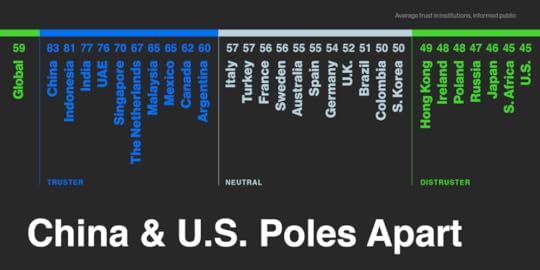
2018 Edelman Trust Barometer
The Battle for Truth
As we begin 2018, we find the world in a new phase in the loss of trust: the unwillingness to believe information, even from those closest to us. The loss of confidence in information channels and sources is the fourth wave of the trust tsunami. The moorings of institutions have already been dangerously undermined by the three previous waves: fear of job loss due to globalization and automation; the Great Recession, which created a crisis of confidence in traditional authority figures and institutions while undermining the middle class; and the effects of massive global migration. Now, in this fourth wave, we have a world without common facts and objective truth, weakening trust even as the global economy recovers.
Gresham’s Law, based on the 18th century observation that debased currency drives out the good, is now evident in the realm of information, with fake news crowding out real news. Leaders are going directly to the people, bashing the media as inaccurate and biased. These forces are taking a toll. According to the 2018 Edelman Trust Barometer, media has become the least-trusted global institution for the first time, with trust scores of over 50 percent in only six nations, five of which are in the developing world. Putting pressure on trust in media are declining trust in search engines and social media. People have retreated into self curated information bubbles, where they read only that with which they agree, as if selecting their playlist for music. Fully half of respondents indicate that they consume mainstream media less than once a week. Nearly six in 10 agree that news organizations are politicized, and nearly one in two agree that they are elitist. Nearly two-thirds agree that the average person cannot distinguish good journalism from falsehoods.
…click on the above link to read the rest of the article…
How long will the rich be willing to share the roads with the poor?
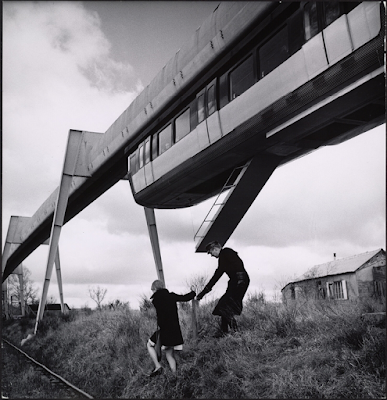
In Ray Bradbury novel “Fahrenheit 451” we are told of a world with no private cars (above, a still from the 1966 movie by François Truffaut). Bradbury had correctly understood that dictatorships not only tend to burn books but also don’t like their citizens to own private cars. In this post, I argue that the growing social inequality in the West may soon lead to the demise of the private car for the middle class. This evolution may be helped by such concepts as TAAS (transportation as a service).
In his “The Betrothed”, (1827) Alessandro Manzoni tells us of how a dispute on the right of the way led to a bloody duel between two noblemen. The story takes place during the 17th century and it seems that, at that time, whether one should cede the way to another was a question of rank.
Of course, in our (perhaps) enlightened times, this attitude looks absurd. When you see a stop sign at a crossroad, you are supposed to respect it, independently of whether you drive a rusty Toyota Corolla or a shiny Porsche Cayenne. But, if you think about that, the rich must be very unhappy about having to share the road with all those poor people with their clunkers. They might well be thinking of ways to have the street all for themselves, avoid traffic jams, and regain the mobility that cars provided when there weren’t so many of them.
Is it possible? Well, think of this: the diffusion of private cars in the Western World, and in particular in the US, took place during a period when inequality was declining and reaching values which were possibly the lowest in modern history. But things have changed a lot since then. Here are some data for the Gini Index in the US (from the US Census Bureau)
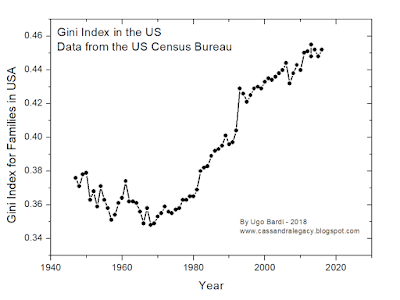
…click on the above link to read the rest of the article…
AI Censorship and the Power of Steem to Preserve Truth
Just read a great article by Caitlin Johnstone over at Medium where she discusses the automation of censorship tools by companies like Twitter and Google.
Putting paid Julian Assange’s warning last year on this, Ms. Johnstone details just some of the abuses that Twitter and Google engaged in to subtly and not-so-subtly shift public perception of major issues that run counter to the narrative the power structure wants us to believe.
And it is for this reason that projects like Steemit are so very important.
I talked about how important Steem is after James O’Keefe’s latest expose of Twitter (read it here). Watching people like Mrs. Johnstone wake up to the problem is great, but she also needs to take the next step.
You can’t hack something whose underlying content is stored in a distributed blockchain. Because the blockchain’s ledger is immutable, what you wrote is preserved in all of its glory (ignominious or otherwise) forever.
As she points out, type of censorship is far worse than simply throwing books into piles and burning them. With DRM and all digital assets, inconvenient truths can be memory-holed off your Kindle never to be seen again.
Abridged versions of books can be substituted for the original text and worse.
So, the blockchain as it pertains to how we communicate is a fundamental need to disrupt this communications super-state they are building.
I can’t stress enough how important this is today.
Now, more than ever, the information war is heating up. And the ability to control not just the validity of what people produce but what everyone consumes is the single most important issue of the age.
If we are to finally break the backs of the people working so hard to maintain their gravy train, we have to build systems that are beyond their control.
…click on the above link to read the rest of the article…
Michigan Faces ANOTHER Water Crisis
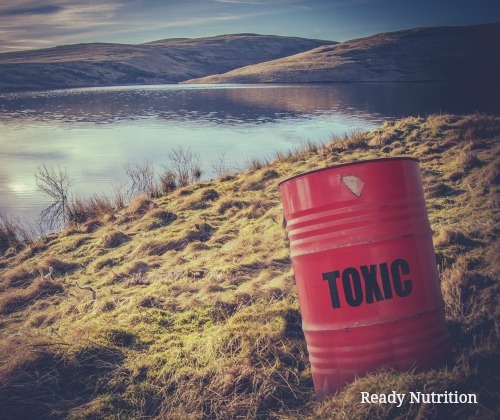 An emerging new water crisis for Michigan
An emerging new water crisis for Michigan
Michigan residents are staring down a new water crisis as the state is scrambling to combat potential health risks in water sources that stem from chemicals long used in firefighting, waterproofing, carpeting and other products.
In December of 2017, toxic chemicals have been identified at 28 sites in 14 communities across Michigan. Nearly half are on or near military installations where the source is believed to be from firefighting foam.” (Source) The main affected area is near Van Etten Lake. Other areas near WAFB are also being investigated.
“Per- and polyfluoroalkyl substances, or PFAS, have been detected at military bases, water treatment plants and, most recently, an old industrial dump site for footwear company Wolverine World Wide. The Environmental Protection Agency classifies them as ’emerging’ nationally. They have sparked enough concern that Gov. Rick Snyder created a state response team and approved $23 million in emergency spending.
What We Know So Far
The Michigan Department of Environmental Quality says private well testing results coupled with a site history that indicates not only that sludge was used as fertilizer, but there may also have been waste dumping in a nearby gravel pit necessitates the well testing. (Source)

Image Source: http://www.mlive.com
Levels of PFOA and PFOS in the groundwater at Wurtsmith Air Force Base (WAFB) in Oscoda Township, Michigan are up to 10,000 times higher than the LTHA.
Groundwater with high levels of PFAS might be moving off-base toward local resident’s drinking water wells.
We know that the PFAS from WAFB are found at low levels in some private drinking water wells. We don’t know if the PFAS in the drinking water wells will stay at low levels. Also, we do not know how long PFAS may have been in the drinking water wells.
…click on the above link to read the rest of the article…
Art Berman: Like It Or Not, The Future Remains All About Oil
Vladimir Yudin | Dreamstime.com
iTunes | Google Play | Download | Report Problem
Art Berman: Like It Or Not, The Future Remains All About Oil
And competition for it is heating up
Art Berman, 40-year veteran in the petroleum production industry and respected geological consultant, returns to the podcast this week to talk about oil.
After the price of oil fell from its previous $100+/bbl highs to under $30/bbl in 2015, many declared dead the concerns raised by peak oil theorists. Headlines selling the “shale miracle” have sought to convince us that the US will one day eclipse Saudi Arabia in oil production. In short: cheap, plentiful oil is here to stay.
How likely is this?
Not at all, warns Berman. World demand for oil shows no signs of abating while the outlook for future production looks increasingly scant. And the competition among nations for this “master resource” will be much more intense in future decades than we’ve been used to:
Since the 1980s, we simply have not been replacing reserves with new discoveries. So how does that work? Well, obviously, we’ve got a lot of oil on production and in reserves, so we’re essentially drawing down our savings account if you want to think about it that way. You can do that for a long time if you’ve got a whole lot of money in your savings account, and we as a planet do. But you can’t do it forever.
Eventually, you either have to stop spending as much so you don’t draw down your savings, or you need to put some money back in the account. And it doesn’t seem like we’re doing much of either, and haven’t been doing much of either for a long time. So the concern is tremendous, at least, in my estimation(…)
…click on the above link to read the rest of the article…



